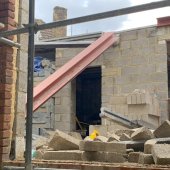Dame Judith Hackitt calls for the construction sector to 'step up and address its problems'

The Final Report of the Grenfell Tower Inquiry is a final call to construction to step up and address its problems, or face further intervention and regulation − that was the clear message presented by Dame Judith Hackitt DBE FREng in her Sir James Wates Lecture for the Chartered Institute of Building (CIOB) in London on 28 November.
Dame Judith described the main conclusion of the Inquiry as having given up hope that the industry could fix its own problems, leading to the various recommendations for government intervention and further regulation of the sector. She called for the industry to take heed and to step up now and demonstrate that it is capable of reform. She cited the petrochemicals, oil and gas and finance sectors as examples of industries that had successfully reformed in the aftermath of major failures and disasters. She was clear that she would much rather be working in a sector that takes control of its future and does not cede it to government and its officials.
It was a reminder that we have only just started on the journey to a construction sector where the safety of all who work in it, and all who occupy what we build, are safe, and feel safe.
Dame Judith began the lecture by recalling the Health and Safety at Work etc Act, which was introduced 50 years ago in 1974 and heralded a seismic shift in the regulation of workplace safety, with prescriptive minimum standards replaced by an outcomes-based regime based on risk assessment and proportionate response. She noted that it took 30 years and the intervention of the late John Prescott at an industry summit to drive change. A key aspect of that summit was that Prescott gave the industry an ultimatum – reform or be regulated – and called a follow-up for the next year to concentrate the minds of industry leaders. As a result of that summit, industry deaths dropped from 100-150 a year to as low as 30, although a recent increase was noted, with some concern.
Dame Judith also challenged professional bodies – whilst she acknowledged that some had stepped up and “deserve ten out of ten” for their efforts so far, there are others "in denial and scoring nought". She called on professional bodies to step up and drive improved standards of competence, and not accept a lowest common denominator approach.
Dame Judith reserved some of her most critical comments for the current CPD model, which she bluntly called "a joke", and "certificates for nothing", calling for a long, hard look at CPD across the sector. She highlighted the importance of professional development and role of the professions in supporting and delivering it.
She noted on several occasions throughout her address that the biggest outstanding challenge is for government to address further regulation of the construction products sector, and called for urgent action to implement the findings of the April 2023 Morrell Day review of construction products and testing.
"It was a challenging evening for all in the audience," said Dr Hywel Davies,
Head of Technical Insight at CABE, "and a reminder that we have only just started on the journey to a construction sector where the safety of all who work in it, and all who occupy what we build, are safe, and feel safe".









